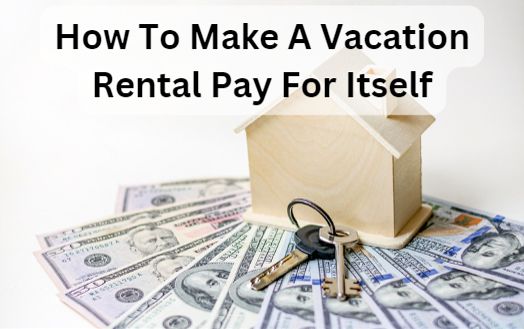How To Make A Vacation Rental Pay For Itself
Vacation rentals have become increasingly popular in recent years, offering travelers the opportunity to enjoy a home away from home with all of the amenities. For some homeowners, renting out their property can be an excellent way to generate extra income and help pay for vacation rental expenses. This article will explore how owners can make their vacation rentals pay for themselves by implementing various strategies.
The first step is to determine what type of rental experience you wish to provide. Are you looking for a short-term stay or long-term occupancy? Will there be additional services provided, such as housekeeping or meal preparation? The answers to these questions will help inform your pricing strategy and enable you to maximize profits while still providing an enjoyable experience for guests.
Next, it is important to take into account the cost of running a vacation rental business. Property maintenance should be factored in when setting rates; this includes any necessary repairs, cleaning fees, and utility costs associated with hosting guests at your property. Additionally, consider adding optional extras that could increase revenue, such as daily breakfast delivery or airport transfers. By carefully evaluating each potential expense, owners can ensure that they are able to cover all costs without overcharging guests. Read tis article to learn how to make a vacation rental pay for itself.
Understanding The Basics Of Vacation Rentals
Vacation rentals are becoming increasingly popular as a way to generate additional income. This is especially true for those who travel frequently and would like to make some money while away from home. For potential renters, vacation rental properties offer an alternative form of accommodation that may be more convenient than traditional hotels or resorts. It can also provide a unique experience that allows guests to live in the area they’re visiting on a short-term basis. In order to maximize their return on investment, however, it’s important for owners to understand all aspects of running a successful vacation rental business.
From understanding legal requirements to finding quality tenants, there are many factors that come into play when deciding whether this type of venture is right for you. Researching local regulations regarding short-term rentals and obtaining proper permits are essential steps to ensure everything runs smoothly. Additionally, knowing how much competition exists in your desired market will help determine pricing structures and other strategies needed to stand out from the crowd.
Finally, establishing policies such as check-in and check-out times, pet restrictions, noise levels, and so on will allow property owners to create a comfortable environment for their guests while protecting their own interests at the same time. With these tips in mind, prospective landlords should now have a better idea of what it takes to make a vacation rental pay for itself, starting with identifying the ideal location for their rental property.
Identifying The Ideal Location For Your Rental Property

Making a vacation rental pay for itself can seem like an impossible task. After all, the property market is ever-changing, and accurate predictions are hard to come by. Fortunately, there are steps you can take to make sure that your rental property pays off in the long run.
First of all, it’s important to find the right location for your investment. The right property location will not only draw more renters but also increase its value over time. It’s worth researching popular holiday destinations so that you understand what types of people tend to book accommodation in those areas. This means understanding which features appeal to different types of visitors—such as proximity to beaches or ski resorts—as well as establishing whether local amenities such as restaurants, bars, and shops add any extra appeal.
It could also be beneficial to look at other properties on the market in similar locations when considering purchasing a property. Exploring competitors’ offers may give you ideas about how you could improve yours and capture new clients with something unique or specialized before investing in a particular place. Additionally, doing some research into current trends within the hospitality industry might help inform your decision-making process too; this way, you’ll know exactly what potential guests want from their stay when they choose your rental property over others nearby!
By taking these measures into account, it makes smart sense to identify a suitable location for your vacation rental home before making any investments. With careful consideration and research beforehand, you can set yourself up for success without wasting valuable resources along the way.
Setting Up Your Vacation Home For Maximum Profit
Before you can start making a profit from your vacation rental, it is important to understand the basics of setting up your property for success. The first step in this process is investing in the right property. If you are looking at purchasing an existing vacation home, be sure to consider factors such as location and size when assessing its potential return on investment.
Additionally, check local laws and regulations regarding property management services and taxes that could affect how much money you will make from renting out your property. Once these considerations have been taken into account, you can begin working with professionals who specialize in rental management so that all necessary paperwork is completed properly and efficiently. This includes things like marketing campaigns, listing descriptions, and booking agreements between guests and owners.
To maximize profits further, research available tax breaks or other incentives offered by local governments to help offset the ownership costs associated with owning a vacation home. By taking these steps to ensure your property is set up correctly for maximum profitability, you can enjoy peace of mind knowing that your hard-earned investment pays off down the road. With proper planning and preparation complete, now comes the time to craft a compelling listing that appeals to prospective guests.
Crafting A Compelling Listing That Appeals To Guests

Owning a second property as a vacation rental can be an effective way to generate income and pay for the expenses associated with owning such a home. Crafting a compelling listing is essential in order to make your rental property attractive to potential guests.
First, start by picking out desirable features of your own home that will stand out on any online platform. Make sure all descriptions are accurate and honest, so there won’t be any surprises when guests arrive at the vacation rental. Second, emphasize amenities that may draw more people into renting your property, like nearby attractions or unique activities available only in the area you live in. Finally, include quality photographs taken from different angles of each room, as well as exterior shots of the building itself if possible.
This gives potential tenants a better idea of what they will find upon arriving at the vacation rental than just relying on verbal descriptions alone. With these steps, it becomes easier to craft listings that appeal to guests who then decide to book their stay in your own home. Mastering online advertising platforms is key in order to effectively market one’s vacation rental and maximize its profit potential.
Mastering Online Advertising Platforms

Advertising rental properties online has become an essential component of a successful vacation rental business. Property management companies are leveraging the power of social media, search engine optimization (SEO), and pay-per-click advertising to reach potential renters more effectively than ever before. In order to maximize income potential from your rental property, it is important to understand how each digital platform works, what types of campaigns work best, and where you can find resources for creating effective marketing strategies. This is an essential step in learning how to make a vacation rental pay for itself.
Digital marketing platforms such as Google Ads offer businesses powerful tools for targeting specific audiences with precision. You can use these tools to identify people who have previously expressed interest in similar products or services through their search history or target those living within a certain geographical area. This type of demographic information is invaluable when determining which ads will be most effective in reaching prospective renters. Additionally, by setting up conversion tracking parameters on your campaign pages, you can measure how well your ad campaigns are performing over time and adjust accordingly if needed.
Online reviews also play a major role in driving bookings for vacation rentals. When guests leave positive feedback about their stay at your property, potential customers are more likely to feel comfortable booking with you too. To ensure that you are getting quality reviews from satisfied customers, make sure that you provide exceptional customer service throughout the entire process—from the inquiry stage right through to check-out day. By providing top-notch hospitality experiences and responding promptly whenever possible, you’ll stand out among other competing properties and increase bookings significantly over time.
With the right combination of digital marketing tactics and great customer service practices, any investment in rental properties could prove lucrative over time. By mastering online advertising platforms and establishing yourself as an authority within this niche audience group, you’ll not only benefit financially but also create lasting relationships with clients who appreciate the value that comes from staying at one of your unique vacation rentals. Now that we’ve covered the basics of online advertising platforms, let’s move on to optimizing your rates and seasonal pricing strategies for maximum success!
Optimizing Your Rates And Seasonal Pricing Strategies
Optimizing rental rates and employing seasonal pricing strategies are key to making a vacation rental pay for itself. The right rate can make all the difference between earning money and breaking even, so it is important to understand how to set fair prices that will attract guests while also ensuring profitability.
Generally, determining the ideal price point involves research into local real estate markets and recent occupancy trends in order for owners to assess their competition and determine an appropriate price range. By familiarizing themselves with their market’s seasonality, owners can adjust their rates accordingly when demand shifts from one period of time to another.
Additionally, owners should use their home as often as possible during slow periods, as this may help reduce costs such as maintenance fees or property taxes. Taking these steps will ensure maximum revenue potential over time and allow owners to enjoy the benefits of owning a profitable rental property without having to worry about long-term financial losses. Without further ado, streamlining the booking process with automation can be beneficial for both hosts and guests alike.
Streamlining The Booking Process With Automation

Streamlining the booking process for one’s vacation rental is paramount to success. Automation can be a great tool for simplifying this often tedious and time-consuming task. Here are some ways automation can help maximize revenue from a rental property:
- Optimizing Rental Market Reach: Utilize automated technology to connect with potential guests on a wide range of platforms, such as Airbnb, HomeAway, VRBO, or Booking.com. This will make it easier to reach more customers in different markets, which increases both occupancy rates and nightly rate potential.
- Minimizing Administrative Tasks: With automation, owners can streamline administrative tasks like responding to inquiries quickly and easily by using templates that allow them to craft customized messages without having to start from scratch each time. Additionally, automated payment processing will ensure quick receipt of payments while also reducing the risk associated with manual transactions.
- Maximizing Return Investment: By leveraging automation features such as setting dynamic pricing rules based on market demand and boosting visibility through search engine optimization techniques, an owner can improve their return on investment significantly over traditional methods.
Automation has become increasingly accessible for short-term landlords looking to stay competitive in the ever-changing rental market. An efficient system helps reduce operational costs while allowing owners more flexibility to focus on other aspects of managing their investment properties and maximizing profits.
Stocking Essentials And Luxuries To Enhance Guests’ Experiences
When running a successful vacation rental, it is essential to provide guests with an experience that exceeds their expectations. Investing in stocking the property with amenities can not only enhance guests’ experiences but also pay off for owners as well. By providing luxury items and essentials for guests, owners can increase the value of their investment properties while still keeping costs low.
The first step to creating a profitable vacation rental is understanding which items are necessary for a comfortable stay. This includes basic necessities such as kitchen appliances, bedding, towels, cleaning supplies, etc. These should all be high-quality products that will last through multiple stays without needing replacement or repair. Additionally, these items must meet safety codes and local regulations where applicable and should not contain any hazardous materials.
From there, homeowners have some room to play around with adding more luxurious amenities to make their property stand out from the competition:
- High-end electronics like flat-screen TVs and surround sound systems
- Designer furniture pieces
- Complimentary toiletries such as shampoos and soaps
- Extra blankets and pillows
- Coffee makers and other small appliances
- WiFi access points throughout the property
By taking into consideration both income and expense when investing in extra amenities, homeowners can maximize profits while ensuring they remain competitive in the market. Furthermore, by offering quality amenities at little additional cost, you provide added value to potential renters, thereby increasing occupancy rates; this could mean higher rental fees being charged per night, making up for initial investments over time. As such, it pays off for home owners who take advantage of enhancing their vacation rentals with stockable luxuries, potentially turning them into sustainable investments!
Developing Relationships With Local Businesses

According to recent studies, nearly half of all vacation rental owners are able to find property that pays for itself. Developing relationships with local businesses can be an effective way to increase the potential income from a vacation rental and attract more people who want to rent it out.
The first step in developing such partnerships is finding local business partners who share your vision of creating memorable experiences for guests. For example, if you own a beachfront property, try reaching out to nearby restaurants or shops that offer unique items related to the ocean. By providing discounts on food or merchandise, these businesses can help make your guests’ stay even more enjoyable while also giving them access to exclusive products they may not find anywhere else.
In addition, partnering with a tour company or outdoor activity provider can give visitors something extra special during their visit. Offering discounted prices on activities like bike tours or kayak trips will add more value to the overall experience and show guests how much you care about their time spent at your rental. Connecting with other tourism-related companies in the area will also provide you with new marketing opportunities and help spread awareness of your business beyond just online channels.
Not only does taking advantage of local resources benefit both businesses involved, but it also enriches the guest’s experience by introducing them to unique places and events they wouldn’t have known about otherwise. Working together towards common goals helps create a sense of community among locals and tourists alike, which fosters meaningful connections between those who wish to explore and discover new things in life. A successful relationship with local businesses has many advantages, so take some time today to start exploring what options might be available near your vacation rental!
Working With Travel Agents To Increase Bookings
Working with travel agents can be an effective way to increase bookings for vacation rentals. Travel agents are often familiar with the different places and types of accommodations available, making them a valuable resource for vacationers seeking new experiences. Property owners who want to maximize their profits should consider working with travel agents as part of their marketing strategy.
Property owners need to do some work in order to make sure that their property is attractive to potential guests through travel agents. First, they must create appealing visuals and descriptions of their rental home that accurately reflect its features and amenities. This includes providing up-to-date photos, a detailed description of the property’s facilities, and accurate information about nearby attractions and activities. Additionally, it is important to ensure that rates are competitive within the local market so that travel agents have an incentive to recommend your property over other options.
Finally, there may be additional benefits associated with working with travel agents, such as discounts on services or access to special offers from other venues in the area. It is important for property owners to research these opportunities before committing themselves so that they can get the most value out of this relationship. By leveraging relationships with travel agents, property owners can increase occupancy at their vacation rental while also diversifying revenue streams beyond just nightly rates. Transitioning into the subsequent section: Leveraging social media provides another means for connecting prospective guests with vacation rental properties.
Leveraging Social Media To Connect With Prospective Guests
Many people may assume that they don’t need to use social media in order to find guests for their vacation rental. However, with the growing competition among properties and the expansive reach of digital platforms, utilizing social media can help generate more leads for a property’s listing and create an effective connection between those interested in renting and the owner.
Social media provides an opportunity for the ownership of a second home or vacation rental to reach beyond its local community. Through posts about amenities, photos of attractive features, videos displaying helpful information such as directions, and engaging conversations with potential renters online, owners are able to maximize their visibility across various networks, which will increase interest from travelers looking for accommodations. Additionally, using these channels allows them to directly target individuals who have expressed similar interests through keywords and hashtags related to their rental type—beachfront view villas, ski-in/ski-out cabins—or any other criteria that might make their particular property stand out above all others.
When done correctly, leveraging social media creates an ideal platform where potential guests can learn more about the property while simultaneously getting inspired by travel stories shared on these outlets. With this approach, owners can develop relationships with prospective customers even before they arrive at the destination, ultimately leading to increased bookings and better reviews due to an improved customer service experience throughout the entire process.
Creating Special Deals And Discounts That Entice Guests

Creating special deals and discounts is an effective way to make a vacation rental pay for itself. When buying property, it can be advantageous to look for properties in areas that are popular tourist destinations or locations with upcoming events. These types of areas usually have higher amounts of people wanting to buy rental properties, as they are confident they will receive regular guests throughout the year due to the high demand.
When creating special deals and discounts, it is important to consider how much money these offers will cost you upfront but also take into account the potential return on investment over time. It may be beneficial to offer discounts during times when there would otherwise be fewer bookings, such as weekends, holidays, or off-season months. Similarly, offering promotions such as early bird rates or last minute specials can help entice additional guests and provide them with a more competitive rate than other comparable listings in the area.
Finally, offering loyalty programs like frequent guest rewards can encourage repeat stays from customers who feel appreciated by your business model. This type of program benefits both parties: renters get discounted fees for their future visits, while owners benefit from repeat clients who require fewer marketing resources overall. Responsibly managing reviews and feedback is another key factor in making sure a vacation rental pays for itself in the long run.
Responsibly Managing Reviews And Feedback To Ensure Your Noticed On The Market
The reviews and feedback from guests on vacation rental sites are essential for success. While positive ratings can draw potential customers to a property, negative ones can have the opposite effect. By responsibly managing this feedback, owners of vacation homes can ensure their properties pay off and generate revenue.
Positive reviews can help enhance the reputation of a property, leading to more bookings in the future. They provide an avenue to demonstrate quality and value that will attract new customers while also preserving existing relationships with returning visitors. On the other hand, negative reviews tend to lower occupancy rates as potential customers look elsewhere for better options. This could lead to a reduced customer base, resulting in fewer profits over time the property pay will reduce.
It is therefore important for owners of vacation homes to take proactive steps such as responding promptly to guest inquiries or complaints, making sure all amenities advertised are available during stays, and offering flexible check-in and check-out times whenever possible. Ensuring that each guest has an enjoyable experience at their property is one way for them to maximize its earning potential and make it truly pay off your investment property.
Maximizing Revenue With Short-Term Rental Insurance

When it comes to maximizing revenue with vacation rentals, one of the most important elements for success is having a reliable short-term rental insurance policy. This type of insurance protects owners from financial losses related to damages caused by guests or other events that occur during their stay. It also helps ensure that renters are able to enjoy peace of mind and security while staying in your property. Here are four key reasons why having a good short-term rental insurance policy can help make your vacation rental pay for itself:
- It covers legal costs associated with any disputes between you and your renter.
- It provides protection against damage or theft of the property or its contents caused by the renter.
- It covers lost rental income due to forced cancellations beyond your control.
- It offers liability coverage should someone be injured on premises owned by you as part of your vacation rental business venture.
Having an adequate short-term rental insurance policy can provide great benefits, not only financially but also in terms of providing reassurance and stability for both parties involved in a vacation rental agreement. Furthermore, such policies can increase customer satisfaction due to the added sense of safety they bring to those renting out properties through Airbnb or similar services; this ultimately leads to increased occupancy rates, which translates into increased revenues for owners who rely on these services, as well as better ratings from customers, which further boosts sales opportunities in the future! Knowing all this, it becomes clear how taking steps towards ensuring proper coverage could really go a long way towards helping make a vacation rental pay for itself over time.
Final Thoughts – Is It Worth Making Effort To Own Some Vacation Rental
It is clear that having a successful vacation rental requires much more than just listing your property online. From understanding the legal requirements to making sure the rental is secure and well-maintained, there are several steps needed for success. Moreover, increasing bookings, setting up a payment system, and handling complaints with grace all require special attention in order to make a vacation rental profitable and enjoyable for both you and your guests.
The effort required to run a successful vacation rental can seem daunting at first; however, taking it one step at a time will help ensure that any potential problems or issues can be dealt with quickly and effectively. With some research into legal matters as well as marketing strategies, creating an inviting atmosphere for guests, and providing exceptional customer service, anyone can turn their vacation rental into a lucrative business venture.
A successful vacation rental pays off exponentially in terms of satisfaction from knowing you have provided an excellent experience while also earning revenue—it truly is the perfect investment opportunity! By following these tips on how to make a vacation rental pay for itself, you can guarantee yourself long-term financial security without sacrificing your quality of life.
FAQ
What Are The Legal Requirements For Running A Vacation Rental?
Running a vacation rental may sound like an exciting and lucrative business venture, but it is important to understand the legal requirements. Different countries have different regulations governing how such businesses must be managed, so it is essential to research these rules before embarking on this journey. Allegorical speaking, running a successful vacation rental can be compared to climbing a mountain—there are many steps that need to be taken in order for success to be achieved at the summit.
The first step when considering launching a vacation rental business is determining what type of accommodation needs to be provided and whether or not any special permits will be required. Depending on the location, running certain types of holiday homes might require additional paperwork or licensing beyond normal property laws. It is also important to make sure all local taxes are paid and up-to-date, if applicable. Furthermore, some locations have specific zoning laws regarding operating within residential areas, which should be researched thoroughly prior to starting operations.
It is also prudent to consider who will manage your rental property while guests are staying there, ensuring security measures are in place, including appropriate locks and alarms, as well as having someone available 24/7 in case of emergency repairs or problems arising with guests during their stay. Moreover, being aware of all relevant insurance policies needed for both yourself and your customers can help protect against unforeseen circumstances, such as damage caused by tenants during their visit. Finally, setting clear guidelines about deposits, fees, and refunds helps ensure that everyone involved understands their rights and responsibilities when renting out a holiday home for short-term stays.
In order for a vacation rental business to reach its potential, understanding the legal requirements associated with operating one is paramount. Doing due diligence into the various permits necessary, along with researching local zoning laws and making sure all taxes are paid correctly, ensures compliance from the outset, while taking proactive measures around managing guests helps build trust amongst clients, leading them back time after time, thus helping secure the long-term sustainability of the business enterprise.
How Do I Make Sure That My Rental Is Secure?
Security is paramount when it comes to running a successful vacation rental. From ensuring the safety of your guests to protecting yourself from liability, it’s important to take all necessary steps to secure your rental property. This article will discuss some tips for making sure that your rental is safe and secure.
First and foremost, you should look into local regulations and laws concerning vacation rentals in your area. Understanding legal requirements specific to renting out properties can help ensure that you’re in compliance with any rules or regulations pertaining to securing the premises. Additionally, if there are any zoning ordinances or permits required for operating a rental business in your area, make sure these are taken care of before opening up shop.
The next step towards security is properly vetting potential tenants. Having an effective screening process can go a long way towards avoiding issues like non-payment or damage caused by irresponsible visitors. Be sure to collect references and run background checks on prospective renters prior to allowing them access to the premises. You may also want to consider purchasing tenant insurance, which provides coverage against theft or damage caused by unruly guests during their stay.
Finally, having a good set of protocols and policies in place can help protect both you and your tenants from any unexpected occurrences while they’re staying at the property. Make sure everyone who visits is aware of what behaviors are expected of them while on site—such as no smoking or loud music after certain hours—so that potential conflicts can be avoided altogether. By taking these precautions, you’ll be able to rest assured knowing that your rental has been adequately secured for all involved parties.
How Can I Increase The Number Of Bookings For My Rental?
Increasing the number of bookings for a vacation rental can be a daunting task, especially as competition in the market increases. However, with careful consideration and strategic marketing plans, it is possible to achieve success. Figuratively speaking, increasing the number of bookings for a rental requires an individual to think like an entrepreneur—one who understands that customer satisfaction is key.
First and foremost, providing quality service to guests should be a top priority. This includes responding quickly to inquiries from potential customers, offering helpful information about local attractions and amenities, setting realistic expectations for property maintenance and cleanliness standards, and ensuring their safety during their stay. Additionally, having a well-designed website or app will help attract more customers, as they will have easy access to all relevant information at their fingertips. Furthermore, utilizing various advertising platforms such as social media sites can also help reach a wider audience of potential renters.
Finally, maintaining good relationships with past customers by sending thank-you messages or small gifts after check-out is another great way to increase repeat business, which could result in additional bookings over time. By taking these steps into account when running a vacation rental business, entrepreneurs will find themselves on track toward achieving their goals while providing excellent service that creates lasting impressions amongst their guests.
What Is The Best Way To Set Up A Payment System For My Rental?
Creating and managing a payment system for a vacation rental can be one of the most difficult parts of running a successful business. Understanding how to set up an effective payment system is key in order to ensure that clients pay promptly and efficiently while also maintaining customer satisfaction.
The first step in setting up an efficient payment system is deciding which types of payments will be accepted. Many rental operators prefer online systems like PayPal or Stripe, as these methods are popular with customers and usually offer easy-to-use user interfaces. Additionally, they provide secure transactions that protect both the owner and the client from any potential problems during the transaction process. Depending on your market, you may also want to consider accepting other forms of payment such as cash, checks, bank transfers, or credit cards.
Once you have decided which payment methods to accept, it’s important to make sure your website reflects this information clearly so that customers understand what their options are when paying for their stay at your rental property. Make sure all relevant details are included, such as fees associated with different types of payments and deadlines for when final payments must be received before check-in time. In addition, consider providing incentives for early payments or bulk bookings by offering discounts or promotions such as free cleaning services after checkout if rent has been paid ahead of time. These strategies can help encourage more people to book your rental property and reduce cancellations due to missed payments or delays in processing them.
By taking the necessary steps beforehand to establish a reliable payment system, owners can rest assured knowing they won’t miss out on any money owed while still keeping customers satisfied with their rental experience, making it easier than ever for vacation rentals to become profitable businesses in the long run.
What Is The Best Way To Handle Guest Complaints?
When it comes to running a vacation rental, handling guest complaints is an unavoidable part of the job. As such, it’s important for landlords to have effective strategies in place to deal with these issues in a timely and satisfactory manner. There are several key considerations when it comes to handling guest complaints:
- Developing clear policies around communication and expectations
- Understanding how to respond promptly
- Maintaining professionalism while addressing concerns
- Being proactive in preventing potential problems
- Having access to resources that can provide further assistance
Developing clear policies can help ensure that guests understand what they can expect from their rental experience and create fewer opportunities for misunderstandings or miscommunications. In addition, landlords should strive to be accessible and responsive so that any complaints or questions may be addressed as soon as possible. Even if the issue cannot be immediately resolved, responding quickly shows respect and appreciation for the guest’s time and concern. Landlords must also remain professional during interactions with guests; this means avoiding hostile language or condescending tones, even when frustrated by difficult situations.
Being proactive is another way landlords can avoid unnecessary complications down the road. Taking regular maintenance checks on properties offers an opportunity to identify minor issues before they become major ones later on. Additionally, having access to reliable customer service support systems such as online chat or email-based services ensures that serious issues don’t go unresolved for too long due to a lack of resources or personnel. Finally, having someone available at all times who has the authority needed to make appropriate decisions regarding refunds or other compensation goes a long way towards helping maintain trust between landlord and tenant relationships over time.
In order for a vacation rental business model to work successfully, landlords need effective techniques for dealing with complaints from their guests. Through developing clear policies about communication expectations and remaining prompt in response times, maintaining professionalism while discussing sensitive topics, being proactive in problem prevention efforts, and accessing additional resources when necessary, landlords will be better equipped to handle disputes swiftly without letting them degenerate into larger conflicts down the line.











